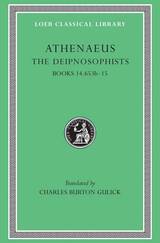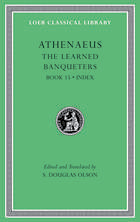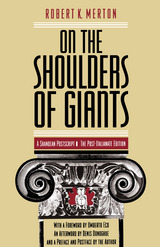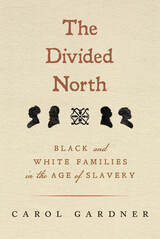
Scholars at dinner.
In The Learned Banqueters, Athenaeus describes a series of dinner parties at which the guests quote extensively from Greek literature. The work (which dates to the very end of the second century AD) is amusing reading and of extraordinary value as a treasury of quotations from works now lost. Athenaeus also preserves a wide range of information about different cuisines and foodstuffs; the music and entertainments that ornamented banquets; and the intellectual talk that was the heart of Greek conviviality. S. Douglas Olson has undertaken to produce a complete new edition of the work, replacing the previous seven-volume Loeb Athenaeus (published under the title Deipnosophists).

Scholars at dinner.
In The Learned Banqueters, Athenaeus describes a series of dinner parties at which the guests quote extensively from Greek literature. The work (which dates to the very end of the second century AD) is amusing reading and of extraordinary value as a treasury of quotations from works now lost. Athenaeus also preserves a wide range of information about different cuisines and foodstuffs; the music and entertainments that ornamented banquets; and the intellectual talk that was the heart of Greek conviviality. S. Douglas Olson has undertaken to produce a complete new edition of the work, replacing the previous seven-volume Loeb Athenaeus (published under the title Deipnosophists).

Scholars at dinner.
In The Learned Banqueters, Athenaeus describes a series of dinner parties at which the guests quote extensively from Greek literature. The work (which dates to the very end of the second century AD) is amusing reading and of extraordinary value as a treasury of quotations from works now lost. Athenaeus also preserves a wide range of information about different cuisines and foodstuffs; the music and entertainments that ornamented banquets; and the intellectual talk that was the heart of Greek conviviality. S. Douglas Olson has undertaken to produce a complete new edition of the work, replacing the previous seven-volume Loeb Athenaeus (published under the title Deipnosophists).

Scholars at dinner.
In The Learned Banqueters, Athenaeus describes a series of dinner parties at which the guests quote extensively from Greek literature. The work (which dates to the very end of the second century AD) is amusing reading and of extraordinary value as a treasury of quotations from works now lost. Athenaeus also preserves a wide range of information about different cuisines and foodstuffs; the music and entertainments that ornamented banquets; and the intellectual talk that was the heart of Greek conviviality. S. Douglas Olson has undertaken to produce a complete new edition of the work, replacing the previous seven-volume Loeb Athenaeus (published under the title Deipnosophists).

Scholars at dinner.
In The Learned Banqueters, Athenaeus describes a series of dinner parties at which the guests quote extensively from Greek literature. The work (which dates to the very end of the second century AD) is amusing reading and of extraordinary value as a treasury of quotations from works now lost. Athenaeus also preserves a wide range of information about different cuisines and foodstuffs; the music and entertainments that ornamented banquets; and the intellectual talk that was the heart of Greek conviviality. S. Douglas Olson has undertaken to produce a complete new edition of the work, replacing the previous seven-volume Loeb Athenaeus (published under the title Deipnosophists).

Scholars at dinner.
In The Learned Banqueters, Athenaeus describes a series of dinner parties at which the guests quote extensively from Greek literature. The work (which dates to the very end of the second century AD) is amusing reading and of extraordinary value as a treasury of quotations from works now lost. Athenaeus also preserves a wide range of information about different cuisines and foodstuffs; the music and entertainments that ornamented banquets; and the intellectual talk that was the heart of Greek conviviality. S. Douglas Olson has undertaken to produce a complete new edition of the work, replacing the previous seven-volume Loeb Athenaeus (published under the title Deipnosophists).

Scholars at dinner.
In The Learned Banqueters, Athenaeus describes a series of dinner parties at which the guests quote extensively from Greek literature. The work (which dates to the very end of the second century AD) is amusing reading and of extraordinary value as a treasury of quotations from works now lost. Athenaeus also preserves a wide range of information about different cuisines and foodstuffs; the music and entertainments that ornamented banquets; and the intellectual talk that was the heart of Greek conviviality. S. Douglas Olson has undertaken to produce a complete new edition of the work, replacing the previous seven-volume Loeb Athenaeus (published under the title Deipnosophists).

Scholars at dinner.
In The Learned Banqueters, Athenaeus describes a series of dinner parties at which the guests quote extensively from Greek literature. The work (which dates to the very end of the second century AD) is amusing reading and of extraordinary value as a treasury of quotations from works now lost. Athenaeus also preserves a wide range of information about different cuisines and foodstuffs; the music and entertainments that ornamented banquets; and the intellectual talk that was the heart of Greek conviviality. S. Douglas Olson has undertaken to produce a complete new edition of the work, replacing the previous seven-volume Loeb Athenaeus (published under the title Deipnosophists).

"This book is the delightful apotheosis of donmanship: Merton parodies scholarliness while being faultlessly scholarly; he scourges pedantry while brandishing his own abstruse learning on every page. The most recondite and obscure scholarly squabbles are transmuted into the material of comedy as the ostensible subject is shouldered to one side by yet another hobby horse from Merton's densely populated stable. He has created a jeu d'esprit which is profoundly suggestive both in detail and as a whole."—Sean French, Times Literary Supplement

One-Way Street is a thoroughfare unlike anything else in literature—by turns exhilarating and bewildering, requiring mental agility and a special kind of urban literacy. Presented here in a new edition with expanded notes, this genre-defying meditation on the semiotics of late-1920s Weimar culture offers a fresh opportunity to encounter Walter Benjamin at his most virtuosic and experimental, writing in a vein that anticipates later masterpieces such as “On the Concept of History” and The Arcades Project.
Composed of sixty short prose pieces that vary wildly in style and theme, One-Way Street evokes a dense cityscape of shops, cafes, and apartments, alive with the hubbub of social interactions and papered over with public inscriptions of all kinds: advertisements, signs, posters, slogans. Benjamin avoids all semblance of linear narrative, enticing readers with a seemingly random sequence of aphorisms, reminiscences, jokes, off-the-cuff observations, dreamlike fantasias, serious philosophical inquiries, apparently unserious philosophical parodies, and trenchant political commentaries. Providing remarkable insight into the occluded meanings of everyday things, Benjamin time and again proves himself the unrivalled interpreter of what he called “the soul of the commodity.”
Despite the diversity of its individual sections, Benjamin’s text is far from formless. Drawing on the avant-garde aesthetics of Dada, Constructivism, and Surrealism, its unusual construction implies a practice of reading that cannot be reduced to simple formulas. Still refractory, still radical, One-Way Street is a work in perpetual progress.

Philosophical Fragments was first published in 1991. Minnesota Archive Editions uses digital technology to make long-unavailable books once again accessible, and are published unaltered from the original University of Minnesota Press editions.
At a time when the function of criticism is again coming under close skeptical scrutiny, Schlegel's unorthodox, highly original mind, as revealed in these foundational "fragments," provides the critical framework for reflecting on contemporary experimental texts.
READERS
Browse our collection.
PUBLISHERS
See BiblioVault's publisher services.
STUDENT SERVICES
Files for college accessibility offices.
UChicago Accessibility Resources
home | accessibility | search | about | contact us
BiblioVault ® 2001 - 2025
The University of Chicago Press









